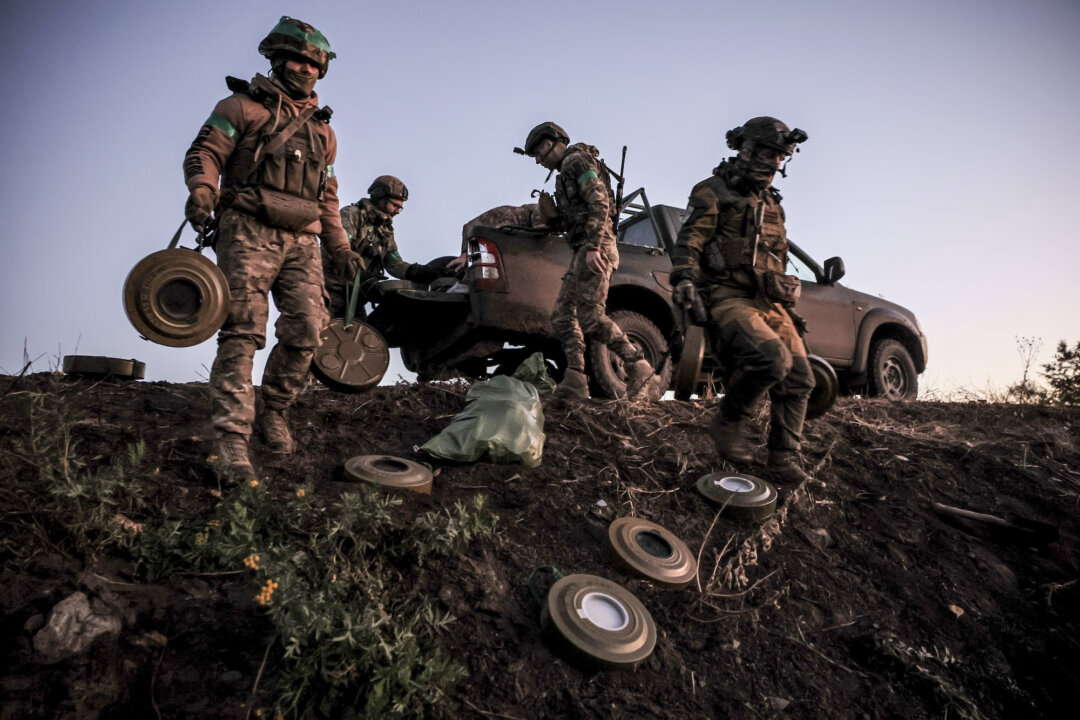The contractors will not engage in combat but provide maintenance on US weapons systems including the F-16 fighter jet and PATRIOT air defense system.
President Joe Biden will allow some American military contractors to operate in Ukraine for the first time since Russia’s full-scale invasion in 2022.
The contractors will not engage in combat. Instead, the new policy will see the Department of Defense solicit bids from contractors to provide repairs and maintenance on systems already delivered to Ukraine.
“In order to help Ukraine repair and maintain military equipment provided by the U.S. and its allies, the [Department of Defense] is soliciting bids for a small number of contractors who will help Ukraine maintain the assistance we’ve already provided,” a defense official told The Epoch Times.
“These contractors will be located far from the front lines and they will not be fighting Russian forces.”
The official said that contractors were needed to help provide timely maintenance on complex U.S.-provided systems including the F-16 fighter jet and PATRIOT air defense system.
Having American specialists on the ground to provide repairs for systems that “require specific technical expertise to maintain” would help to ensure they were “quickly returned to the front lines,” the official said.
“Having small numbers of contractors in Ukraine conducting maintenance away from the front lines will help ensure U.S.-provided equipment can be rapidly repaired when damaged and be provided maintenance as needed in a more efficient manner.”
The official noted that there are numerous American companies with personnel fulfilling contracts in Ukraine for the local government at present, so the new contracts would “not lead to a substantial increase of employees of U.S. companies working on the ground in Ukraine.”
There are also various U.S. government contractors from the Department of State and the Agency for International Development working in Ukraine to assist in strengthening the nation’s energy grid and providing economic support.
Ukraine has struggled to hold ground against Russian advances in recent months, losing territory in the southeast and now also fighting North Korean troops in the Russian region of Kursk, which Ukraine has held since a surprise August counteroffensive.
The decision to allow U.S. military contractors to enter Ukraine was announced two months before President-elect Donald Trump is set to enter office for a second term as president of the United States.
Trump has criticized indefinite support by the U.S. in Ukraine as risking war between Russia and NATO and has said that he would broker a peace deal between the two nations on “day one” of his administration.
Ukrainian officials have expressed fears that they will be forced to make needless concessions to Moscow when Trump enters office while Trump has long maintained that preventing the war from becoming a nuclear conflict would be his priority.
“We’re going to end up in a third world war, and it will be a war like no other because of nuclear weapons, the power of weaponry,” Trump said during the presidential debate in September.
To that end, Russia has also sought to leverage its nuclear arsenal as a key tool for keeping the United States out of more direct involvement in the war.
Russian President Vladimir Putin announced in September that Moscow was considering changes to its strategic doctrine that would allow it to use nuclear weapons against any nuclear power providing arms used against the Russian homeland.
“It is proposed that aggression against Russia by any non-nuclear state, but with the participation or support of a nuclear state, be considered as their joint attack on the Russian Federation,” Putin said during a meeting of Russia’s Security Council on Sept. 25.
Those comments appeared to be a warning to Biden, whose administration has been pressured by Ukraine and other European partners to allow Kyiv to launch long-range strikes into Russia.
Biden has thus far refused to allow Ukraine to use U.S. weapons against Russian territory unless striking military targets directly behind the front lines.
On the issue of escalation, the defense official said that the decision to allow military contractors into Ukraine was made carefully, and that the contractors would be required to submit plans to reduce the risk of their presence as part of the bidding process.
“The Department made this decision after careful risk assessment and in coordination with interagency stakeholders,” the official said.
“Each U.S. contractor, organization or company will be responsible for the safety and security of their employees and will be required to include risk mitigation plans as part of their bids.”

